Organisational Behaviour Report: Ryanair Case Study, Leadership
VerifiedAdded on 2021/01/02
|11
|3922
|256
Report
AI Summary
This report provides an in-depth analysis of organisational behaviour, using Ryanair as a case study. It begins by examining the airline's organisational culture, power dynamics, and political behaviour, applying Handy's culture typology and French and Raven's power model. The report then explores motivation theories, including content and process theories, such as Maslow's hierarchy of needs and Vroom's expectancy theory, to understand how to achieve organisational goals. Finally, it identifies and explains different types of teams, including Belbin's model and the path-goal theory, while also addressing barriers to implementing new organisational structures. The report aims to provide a comprehensive understanding of how organisational behaviour principles apply to a real-world business context, focusing on leadership, motivation, and team effectiveness.
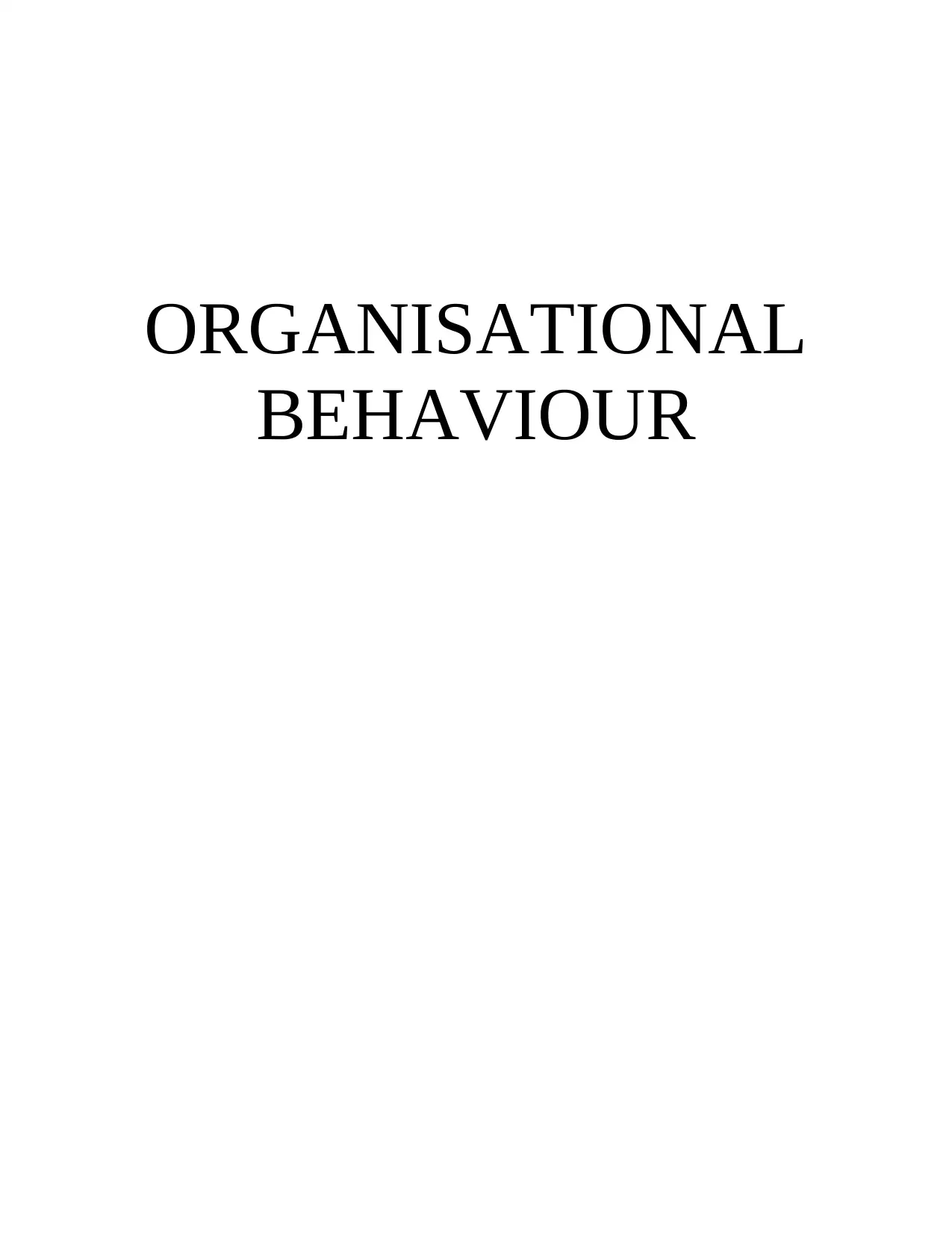
ORGANISATIONAL
BEHAVIOUR
BEHAVIOUR
Paraphrase This Document
Need a fresh take? Get an instant paraphrase of this document with our AI Paraphraser
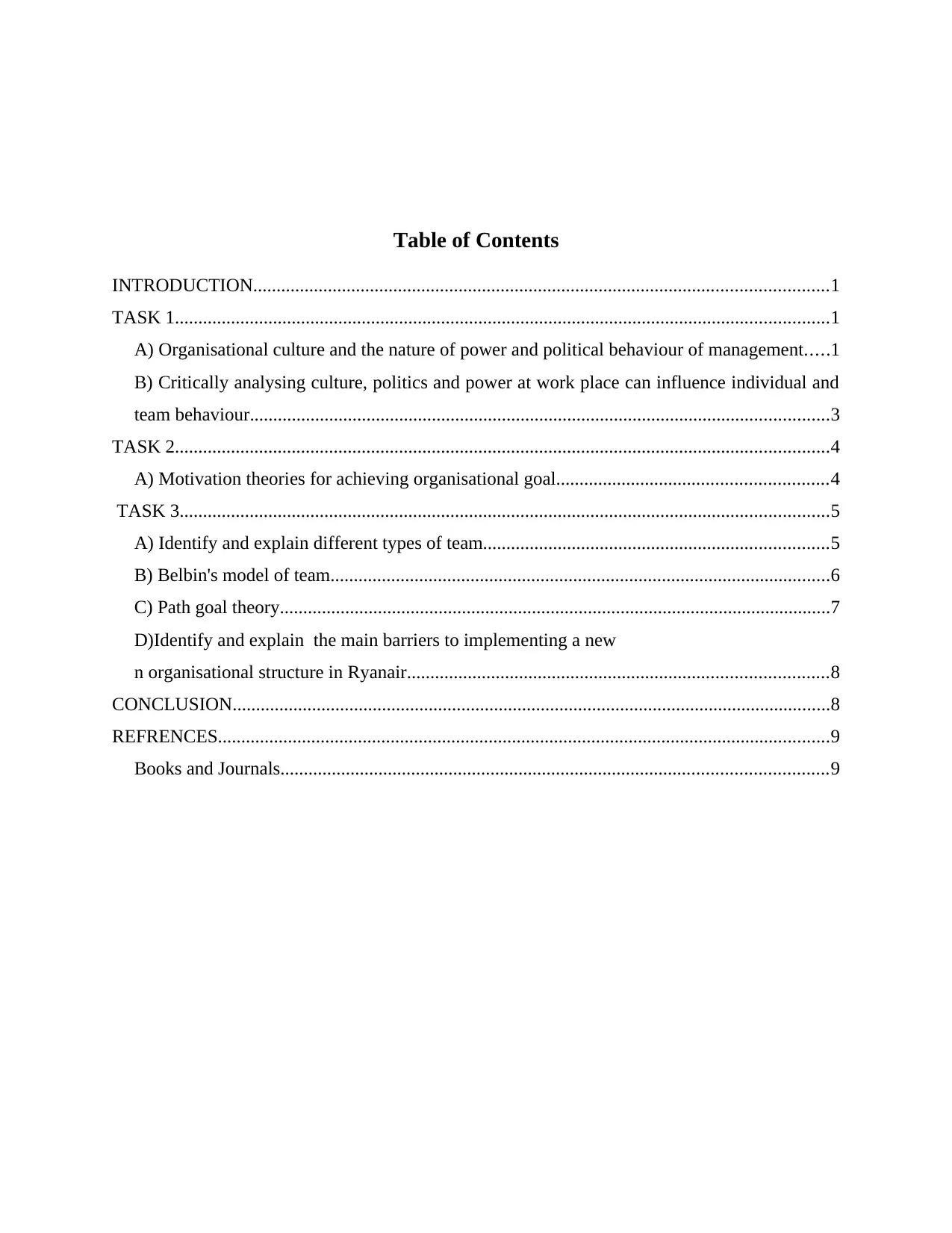
Table of Contents
INTRODUCTION...........................................................................................................................1
TASK 1............................................................................................................................................1
A) Organisational culture and the nature of power and political behaviour of management.....1
B) Critically analysing culture, politics and power at work place can influence individual and
team behaviour............................................................................................................................3
TASK 2............................................................................................................................................4
A) Motivation theories for achieving organisational goal..........................................................4
TASK 3...........................................................................................................................................5
A) Identify and explain different types of team..........................................................................5
B) Belbin's model of team...........................................................................................................6
C) Path goal theory......................................................................................................................7
D)Identify and explain the main barriers to implementing a new
n organisational structure in Ryanair..........................................................................................8
CONCLUSION................................................................................................................................8
REFRENCES...................................................................................................................................9
Books and Journals.....................................................................................................................9
INTRODUCTION...........................................................................................................................1
TASK 1............................................................................................................................................1
A) Organisational culture and the nature of power and political behaviour of management.....1
B) Critically analysing culture, politics and power at work place can influence individual and
team behaviour............................................................................................................................3
TASK 2............................................................................................................................................4
A) Motivation theories for achieving organisational goal..........................................................4
TASK 3...........................................................................................................................................5
A) Identify and explain different types of team..........................................................................5
B) Belbin's model of team...........................................................................................................6
C) Path goal theory......................................................................................................................7
D)Identify and explain the main barriers to implementing a new
n organisational structure in Ryanair..........................................................................................8
CONCLUSION................................................................................................................................8
REFRENCES...................................................................................................................................9
Books and Journals.....................................................................................................................9
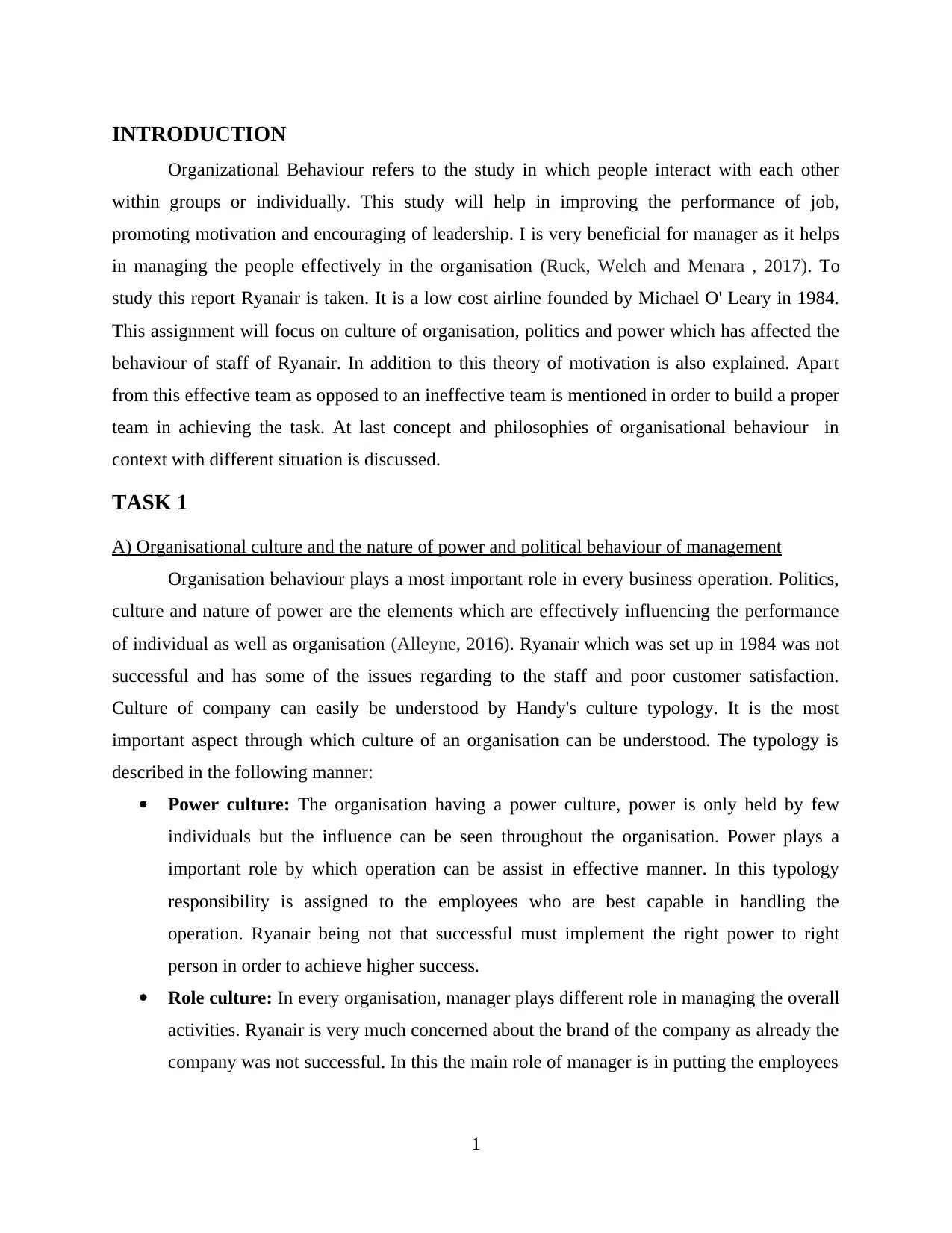
INTRODUCTION
Organizational Behaviour refers to the study in which people interact with each other
within groups or individually. This study will help in improving the performance of job,
promoting motivation and encouraging of leadership. I is very beneficial for manager as it helps
in managing the people effectively in the organisation (Ruck, Welch and Menara , 2017). To
study this report Ryanair is taken. It is a low cost airline founded by Michael O' Leary in 1984.
This assignment will focus on culture of organisation, politics and power which has affected the
behaviour of staff of Ryanair. In addition to this theory of motivation is also explained. Apart
from this effective team as opposed to an ineffective team is mentioned in order to build a proper
team in achieving the task. At last concept and philosophies of organisational behaviour in
context with different situation is discussed.
TASK 1
A) Organisational culture and the nature of power and political behaviour of management
Organisation behaviour plays a most important role in every business operation. Politics,
culture and nature of power are the elements which are effectively influencing the performance
of individual as well as organisation (Alleyne, 2016). Ryanair which was set up in 1984 was not
successful and has some of the issues regarding to the staff and poor customer satisfaction.
Culture of company can easily be understood by Handy's culture typology. It is the most
important aspect through which culture of an organisation can be understood. The typology is
described in the following manner:
Power culture: The organisation having a power culture, power is only held by few
individuals but the influence can be seen throughout the organisation. Power plays a
important role by which operation can be assist in effective manner. In this typology
responsibility is assigned to the employees who are best capable in handling the
operation. Ryanair being not that successful must implement the right power to right
person in order to achieve higher success.
Role culture: In every organisation, manager plays different role in managing the overall
activities. Ryanair is very much concerned about the brand of the company as already the
company was not successful. In this the main role of manager is in putting the employees
1
Organizational Behaviour refers to the study in which people interact with each other
within groups or individually. This study will help in improving the performance of job,
promoting motivation and encouraging of leadership. I is very beneficial for manager as it helps
in managing the people effectively in the organisation (Ruck, Welch and Menara , 2017). To
study this report Ryanair is taken. It is a low cost airline founded by Michael O' Leary in 1984.
This assignment will focus on culture of organisation, politics and power which has affected the
behaviour of staff of Ryanair. In addition to this theory of motivation is also explained. Apart
from this effective team as opposed to an ineffective team is mentioned in order to build a proper
team in achieving the task. At last concept and philosophies of organisational behaviour in
context with different situation is discussed.
TASK 1
A) Organisational culture and the nature of power and political behaviour of management
Organisation behaviour plays a most important role in every business operation. Politics,
culture and nature of power are the elements which are effectively influencing the performance
of individual as well as organisation (Alleyne, 2016). Ryanair which was set up in 1984 was not
successful and has some of the issues regarding to the staff and poor customer satisfaction.
Culture of company can easily be understood by Handy's culture typology. It is the most
important aspect through which culture of an organisation can be understood. The typology is
described in the following manner:
Power culture: The organisation having a power culture, power is only held by few
individuals but the influence can be seen throughout the organisation. Power plays a
important role by which operation can be assist in effective manner. In this typology
responsibility is assigned to the employees who are best capable in handling the
operation. Ryanair being not that successful must implement the right power to right
person in order to achieve higher success.
Role culture: In every organisation, manager plays different role in managing the overall
activities. Ryanair is very much concerned about the brand of the company as already the
company was not successful. In this the main role of manager is in putting the employees
1
⊘ This is a preview!⊘
Do you want full access?
Subscribe today to unlock all pages.

Trusted by 1+ million students worldwide
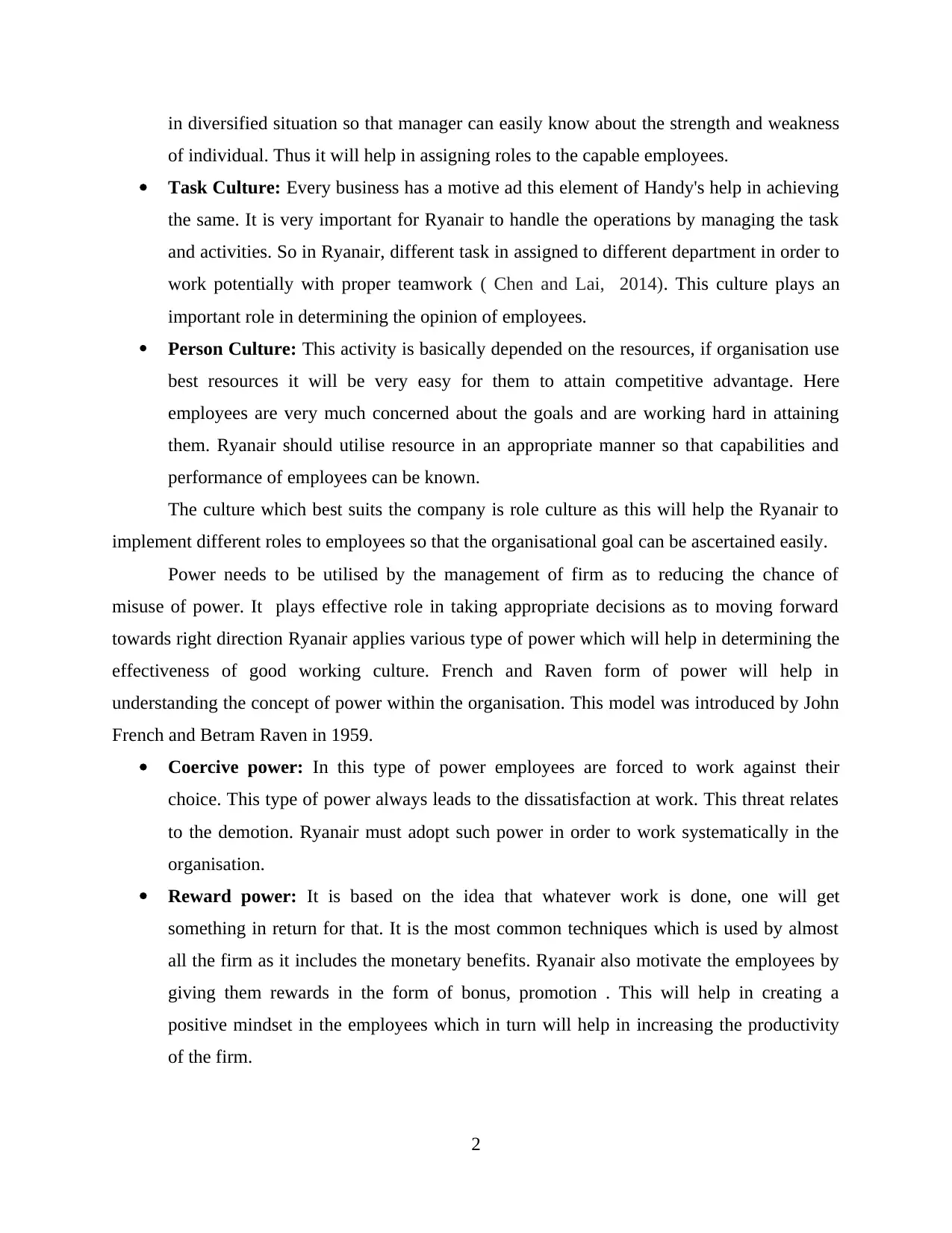
in diversified situation so that manager can easily know about the strength and weakness
of individual. Thus it will help in assigning roles to the capable employees.
Task Culture: Every business has a motive ad this element of Handy's help in achieving
the same. It is very important for Ryanair to handle the operations by managing the task
and activities. So in Ryanair, different task in assigned to different department in order to
work potentially with proper teamwork ( Chen and Lai, 2014). This culture plays an
important role in determining the opinion of employees.
Person Culture: This activity is basically depended on the resources, if organisation use
best resources it will be very easy for them to attain competitive advantage. Here
employees are very much concerned about the goals and are working hard in attaining
them. Ryanair should utilise resource in an appropriate manner so that capabilities and
performance of employees can be known.
The culture which best suits the company is role culture as this will help the Ryanair to
implement different roles to employees so that the organisational goal can be ascertained easily.
Power needs to be utilised by the management of firm as to reducing the chance of
misuse of power. It plays effective role in taking appropriate decisions as to moving forward
towards right direction Ryanair applies various type of power which will help in determining the
effectiveness of good working culture. French and Raven form of power will help in
understanding the concept of power within the organisation. This model was introduced by John
French and Betram Raven in 1959.
Coercive power: In this type of power employees are forced to work against their
choice. This type of power always leads to the dissatisfaction at work. This threat relates
to the demotion. Ryanair must adopt such power in order to work systematically in the
organisation.
Reward power: It is based on the idea that whatever work is done, one will get
something in return for that. It is the most common techniques which is used by almost
all the firm as it includes the monetary benefits. Ryanair also motivate the employees by
giving them rewards in the form of bonus, promotion . This will help in creating a
positive mindset in the employees which in turn will help in increasing the productivity
of the firm.
2
of individual. Thus it will help in assigning roles to the capable employees.
Task Culture: Every business has a motive ad this element of Handy's help in achieving
the same. It is very important for Ryanair to handle the operations by managing the task
and activities. So in Ryanair, different task in assigned to different department in order to
work potentially with proper teamwork ( Chen and Lai, 2014). This culture plays an
important role in determining the opinion of employees.
Person Culture: This activity is basically depended on the resources, if organisation use
best resources it will be very easy for them to attain competitive advantage. Here
employees are very much concerned about the goals and are working hard in attaining
them. Ryanair should utilise resource in an appropriate manner so that capabilities and
performance of employees can be known.
The culture which best suits the company is role culture as this will help the Ryanair to
implement different roles to employees so that the organisational goal can be ascertained easily.
Power needs to be utilised by the management of firm as to reducing the chance of
misuse of power. It plays effective role in taking appropriate decisions as to moving forward
towards right direction Ryanair applies various type of power which will help in determining the
effectiveness of good working culture. French and Raven form of power will help in
understanding the concept of power within the organisation. This model was introduced by John
French and Betram Raven in 1959.
Coercive power: In this type of power employees are forced to work against their
choice. This type of power always leads to the dissatisfaction at work. This threat relates
to the demotion. Ryanair must adopt such power in order to work systematically in the
organisation.
Reward power: It is based on the idea that whatever work is done, one will get
something in return for that. It is the most common techniques which is used by almost
all the firm as it includes the monetary benefits. Ryanair also motivate the employees by
giving them rewards in the form of bonus, promotion . This will help in creating a
positive mindset in the employees which in turn will help in increasing the productivity
of the firm.
2
Paraphrase This Document
Need a fresh take? Get an instant paraphrase of this document with our AI Paraphraser
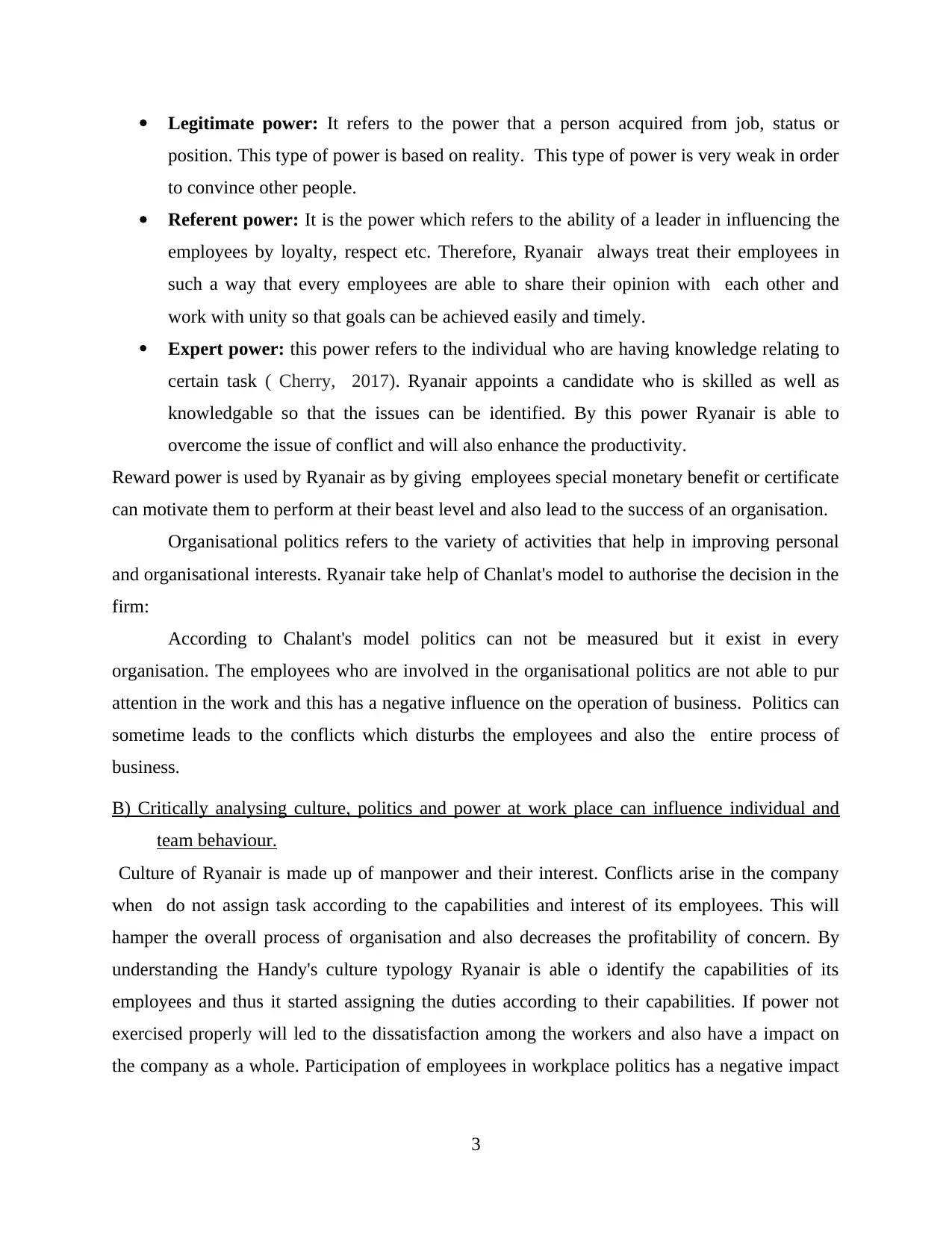
Legitimate power: It refers to the power that a person acquired from job, status or
position. This type of power is based on reality. This type of power is very weak in order
to convince other people.
Referent power: It is the power which refers to the ability of a leader in influencing the
employees by loyalty, respect etc. Therefore, Ryanair always treat their employees in
such a way that every employees are able to share their opinion with each other and
work with unity so that goals can be achieved easily and timely.
Expert power: this power refers to the individual who are having knowledge relating to
certain task ( Cherry, 2017). Ryanair appoints a candidate who is skilled as well as
knowledgable so that the issues can be identified. By this power Ryanair is able to
overcome the issue of conflict and will also enhance the productivity.
Reward power is used by Ryanair as by giving employees special monetary benefit or certificate
can motivate them to perform at their beast level and also lead to the success of an organisation.
Organisational politics refers to the variety of activities that help in improving personal
and organisational interests. Ryanair take help of Chanlat's model to authorise the decision in the
firm:
According to Chalant's model politics can not be measured but it exist in every
organisation. The employees who are involved in the organisational politics are not able to pur
attention in the work and this has a negative influence on the operation of business. Politics can
sometime leads to the conflicts which disturbs the employees and also the entire process of
business.
B) Critically analysing culture, politics and power at work place can influence individual and
team behaviour.
Culture of Ryanair is made up of manpower and their interest. Conflicts arise in the company
when do not assign task according to the capabilities and interest of its employees. This will
hamper the overall process of organisation and also decreases the profitability of concern. By
understanding the Handy's culture typology Ryanair is able o identify the capabilities of its
employees and thus it started assigning the duties according to their capabilities. If power not
exercised properly will led to the dissatisfaction among the workers and also have a impact on
the company as a whole. Participation of employees in workplace politics has a negative impact
3
position. This type of power is based on reality. This type of power is very weak in order
to convince other people.
Referent power: It is the power which refers to the ability of a leader in influencing the
employees by loyalty, respect etc. Therefore, Ryanair always treat their employees in
such a way that every employees are able to share their opinion with each other and
work with unity so that goals can be achieved easily and timely.
Expert power: this power refers to the individual who are having knowledge relating to
certain task ( Cherry, 2017). Ryanair appoints a candidate who is skilled as well as
knowledgable so that the issues can be identified. By this power Ryanair is able to
overcome the issue of conflict and will also enhance the productivity.
Reward power is used by Ryanair as by giving employees special monetary benefit or certificate
can motivate them to perform at their beast level and also lead to the success of an organisation.
Organisational politics refers to the variety of activities that help in improving personal
and organisational interests. Ryanair take help of Chanlat's model to authorise the decision in the
firm:
According to Chalant's model politics can not be measured but it exist in every
organisation. The employees who are involved in the organisational politics are not able to pur
attention in the work and this has a negative influence on the operation of business. Politics can
sometime leads to the conflicts which disturbs the employees and also the entire process of
business.
B) Critically analysing culture, politics and power at work place can influence individual and
team behaviour.
Culture of Ryanair is made up of manpower and their interest. Conflicts arise in the company
when do not assign task according to the capabilities and interest of its employees. This will
hamper the overall process of organisation and also decreases the profitability of concern. By
understanding the Handy's culture typology Ryanair is able o identify the capabilities of its
employees and thus it started assigning the duties according to their capabilities. If power not
exercised properly will led to the dissatisfaction among the workers and also have a impact on
the company as a whole. Participation of employees in workplace politics has a negative impact
3
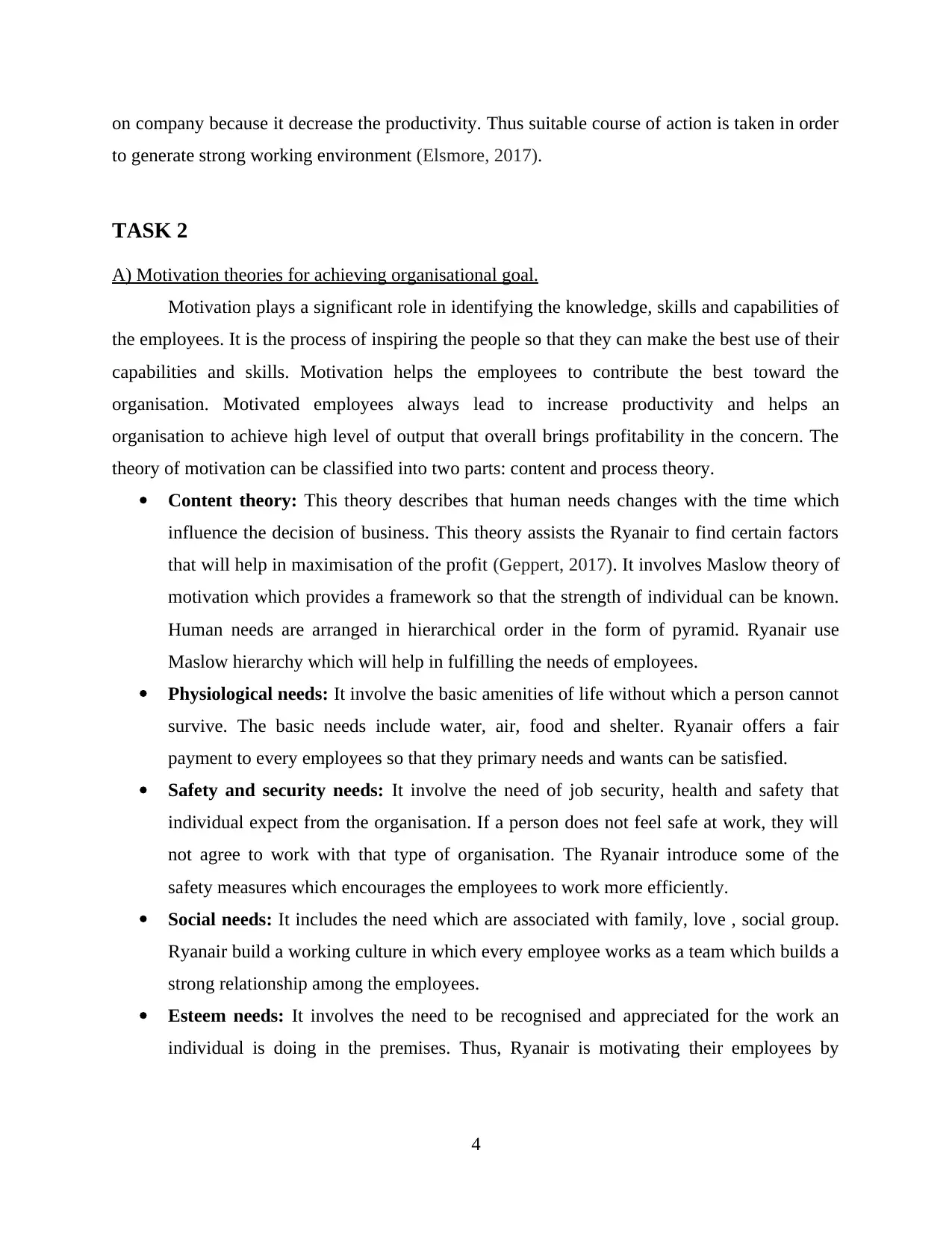
on company because it decrease the productivity. Thus suitable course of action is taken in order
to generate strong working environment (Elsmore, 2017).
TASK 2
A) Motivation theories for achieving organisational goal.
Motivation plays a significant role in identifying the knowledge, skills and capabilities of
the employees. It is the process of inspiring the people so that they can make the best use of their
capabilities and skills. Motivation helps the employees to contribute the best toward the
organisation. Motivated employees always lead to increase productivity and helps an
organisation to achieve high level of output that overall brings profitability in the concern. The
theory of motivation can be classified into two parts: content and process theory.
Content theory: This theory describes that human needs changes with the time which
influence the decision of business. This theory assists the Ryanair to find certain factors
that will help in maximisation of the profit (Geppert, 2017). It involves Maslow theory of
motivation which provides a framework so that the strength of individual can be known.
Human needs are arranged in hierarchical order in the form of pyramid. Ryanair use
Maslow hierarchy which will help in fulfilling the needs of employees.
Physiological needs: It involve the basic amenities of life without which a person cannot
survive. The basic needs include water, air, food and shelter. Ryanair offers a fair
payment to every employees so that they primary needs and wants can be satisfied.
Safety and security needs: It involve the need of job security, health and safety that
individual expect from the organisation. If a person does not feel safe at work, they will
not agree to work with that type of organisation. The Ryanair introduce some of the
safety measures which encourages the employees to work more efficiently.
Social needs: It includes the need which are associated with family, love , social group.
Ryanair build a working culture in which every employee works as a team which builds a
strong relationship among the employees.
Esteem needs: It involves the need to be recognised and appreciated for the work an
individual is doing in the premises. Thus, Ryanair is motivating their employees by
4
to generate strong working environment (Elsmore, 2017).
TASK 2
A) Motivation theories for achieving organisational goal.
Motivation plays a significant role in identifying the knowledge, skills and capabilities of
the employees. It is the process of inspiring the people so that they can make the best use of their
capabilities and skills. Motivation helps the employees to contribute the best toward the
organisation. Motivated employees always lead to increase productivity and helps an
organisation to achieve high level of output that overall brings profitability in the concern. The
theory of motivation can be classified into two parts: content and process theory.
Content theory: This theory describes that human needs changes with the time which
influence the decision of business. This theory assists the Ryanair to find certain factors
that will help in maximisation of the profit (Geppert, 2017). It involves Maslow theory of
motivation which provides a framework so that the strength of individual can be known.
Human needs are arranged in hierarchical order in the form of pyramid. Ryanair use
Maslow hierarchy which will help in fulfilling the needs of employees.
Physiological needs: It involve the basic amenities of life without which a person cannot
survive. The basic needs include water, air, food and shelter. Ryanair offers a fair
payment to every employees so that they primary needs and wants can be satisfied.
Safety and security needs: It involve the need of job security, health and safety that
individual expect from the organisation. If a person does not feel safe at work, they will
not agree to work with that type of organisation. The Ryanair introduce some of the
safety measures which encourages the employees to work more efficiently.
Social needs: It includes the need which are associated with family, love , social group.
Ryanair build a working culture in which every employee works as a team which builds a
strong relationship among the employees.
Esteem needs: It involves the need to be recognised and appreciated for the work an
individual is doing in the premises. Thus, Ryanair is motivating their employees by
4
⊘ This is a preview!⊘
Do you want full access?
Subscribe today to unlock all pages.

Trusted by 1+ million students worldwide
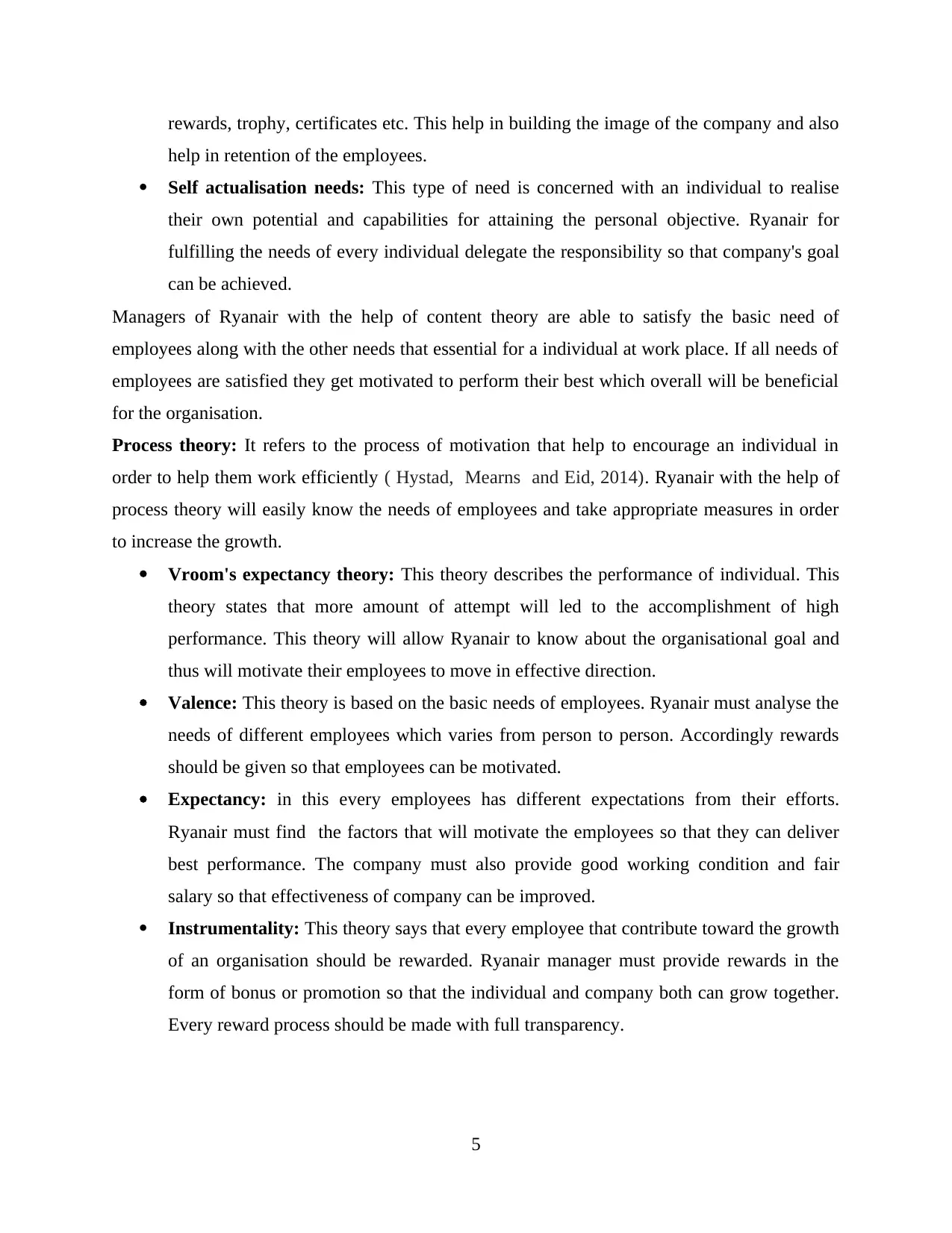
rewards, trophy, certificates etc. This help in building the image of the company and also
help in retention of the employees.
Self actualisation needs: This type of need is concerned with an individual to realise
their own potential and capabilities for attaining the personal objective. Ryanair for
fulfilling the needs of every individual delegate the responsibility so that company's goal
can be achieved.
Managers of Ryanair with the help of content theory are able to satisfy the basic need of
employees along with the other needs that essential for a individual at work place. If all needs of
employees are satisfied they get motivated to perform their best which overall will be beneficial
for the organisation.
Process theory: It refers to the process of motivation that help to encourage an individual in
order to help them work efficiently ( Hystad, Mearns and Eid, 2014). Ryanair with the help of
process theory will easily know the needs of employees and take appropriate measures in order
to increase the growth.
Vroom's expectancy theory: This theory describes the performance of individual. This
theory states that more amount of attempt will led to the accomplishment of high
performance. This theory will allow Ryanair to know about the organisational goal and
thus will motivate their employees to move in effective direction.
Valence: This theory is based on the basic needs of employees. Ryanair must analyse the
needs of different employees which varies from person to person. Accordingly rewards
should be given so that employees can be motivated.
Expectancy: in this every employees has different expectations from their efforts.
Ryanair must find the factors that will motivate the employees so that they can deliver
best performance. The company must also provide good working condition and fair
salary so that effectiveness of company can be improved.
Instrumentality: This theory says that every employee that contribute toward the growth
of an organisation should be rewarded. Ryanair manager must provide rewards in the
form of bonus or promotion so that the individual and company both can grow together.
Every reward process should be made with full transparency.
5
help in retention of the employees.
Self actualisation needs: This type of need is concerned with an individual to realise
their own potential and capabilities for attaining the personal objective. Ryanair for
fulfilling the needs of every individual delegate the responsibility so that company's goal
can be achieved.
Managers of Ryanair with the help of content theory are able to satisfy the basic need of
employees along with the other needs that essential for a individual at work place. If all needs of
employees are satisfied they get motivated to perform their best which overall will be beneficial
for the organisation.
Process theory: It refers to the process of motivation that help to encourage an individual in
order to help them work efficiently ( Hystad, Mearns and Eid, 2014). Ryanair with the help of
process theory will easily know the needs of employees and take appropriate measures in order
to increase the growth.
Vroom's expectancy theory: This theory describes the performance of individual. This
theory states that more amount of attempt will led to the accomplishment of high
performance. This theory will allow Ryanair to know about the organisational goal and
thus will motivate their employees to move in effective direction.
Valence: This theory is based on the basic needs of employees. Ryanair must analyse the
needs of different employees which varies from person to person. Accordingly rewards
should be given so that employees can be motivated.
Expectancy: in this every employees has different expectations from their efforts.
Ryanair must find the factors that will motivate the employees so that they can deliver
best performance. The company must also provide good working condition and fair
salary so that effectiveness of company can be improved.
Instrumentality: This theory says that every employee that contribute toward the growth
of an organisation should be rewarded. Ryanair manager must provide rewards in the
form of bonus or promotion so that the individual and company both can grow together.
Every reward process should be made with full transparency.
5
Paraphrase This Document
Need a fresh take? Get an instant paraphrase of this document with our AI Paraphraser
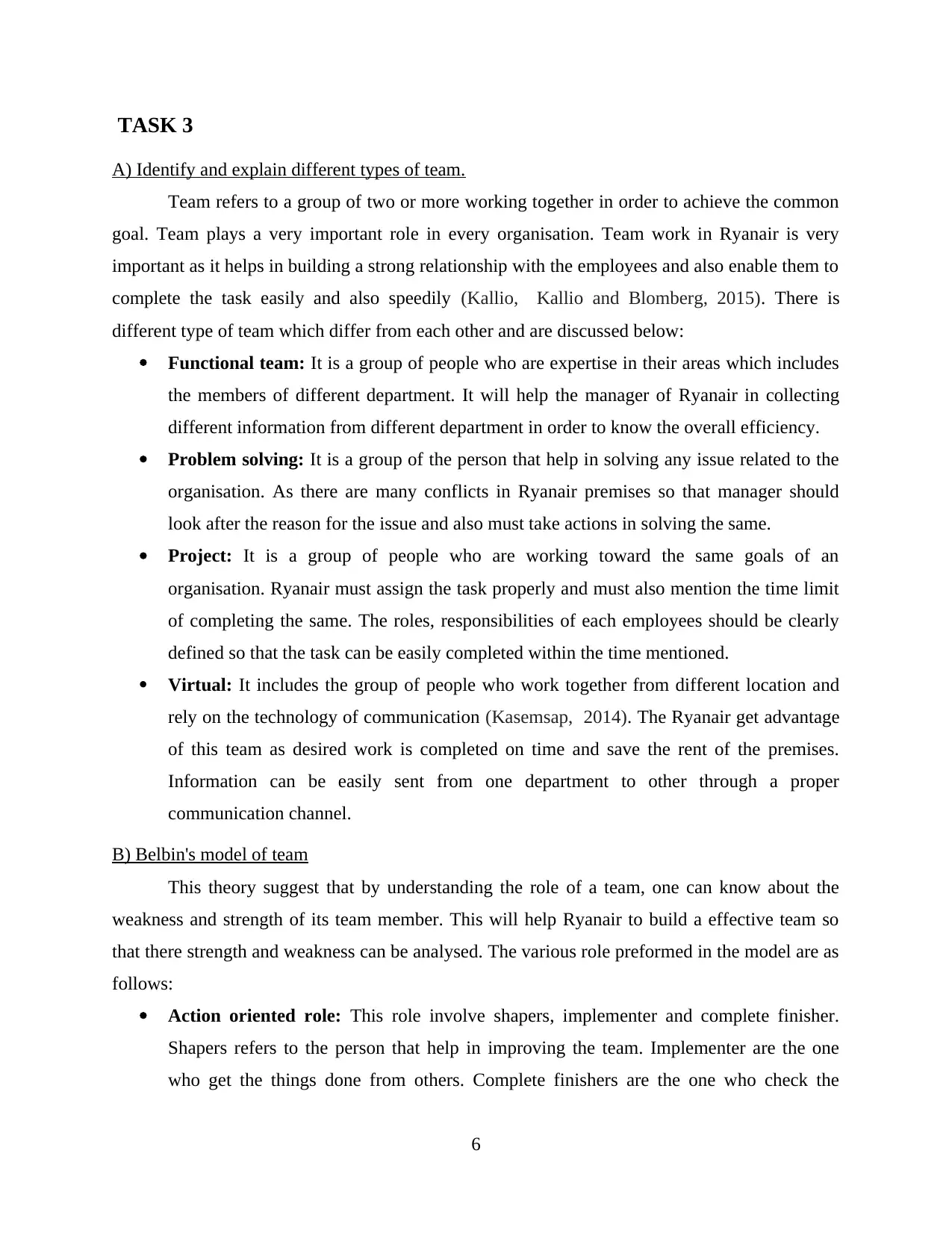
TASK 3
A) Identify and explain different types of team.
Team refers to a group of two or more working together in order to achieve the common
goal. Team plays a very important role in every organisation. Team work in Ryanair is very
important as it helps in building a strong relationship with the employees and also enable them to
complete the task easily and also speedily (Kallio, Kallio and Blomberg, 2015). There is
different type of team which differ from each other and are discussed below:
Functional team: It is a group of people who are expertise in their areas which includes
the members of different department. It will help the manager of Ryanair in collecting
different information from different department in order to know the overall efficiency.
Problem solving: It is a group of the person that help in solving any issue related to the
organisation. As there are many conflicts in Ryanair premises so that manager should
look after the reason for the issue and also must take actions in solving the same.
Project: It is a group of people who are working toward the same goals of an
organisation. Ryanair must assign the task properly and must also mention the time limit
of completing the same. The roles, responsibilities of each employees should be clearly
defined so that the task can be easily completed within the time mentioned.
Virtual: It includes the group of people who work together from different location and
rely on the technology of communication (Kasemsap, 2014). The Ryanair get advantage
of this team as desired work is completed on time and save the rent of the premises.
Information can be easily sent from one department to other through a proper
communication channel.
B) Belbin's model of team
This theory suggest that by understanding the role of a team, one can know about the
weakness and strength of its team member. This will help Ryanair to build a effective team so
that there strength and weakness can be analysed. The various role preformed in the model are as
follows:
Action oriented role: This role involve shapers, implementer and complete finisher.
Shapers refers to the person that help in improving the team. Implementer are the one
who get the things done from others. Complete finishers are the one who check the
6
A) Identify and explain different types of team.
Team refers to a group of two or more working together in order to achieve the common
goal. Team plays a very important role in every organisation. Team work in Ryanair is very
important as it helps in building a strong relationship with the employees and also enable them to
complete the task easily and also speedily (Kallio, Kallio and Blomberg, 2015). There is
different type of team which differ from each other and are discussed below:
Functional team: It is a group of people who are expertise in their areas which includes
the members of different department. It will help the manager of Ryanair in collecting
different information from different department in order to know the overall efficiency.
Problem solving: It is a group of the person that help in solving any issue related to the
organisation. As there are many conflicts in Ryanair premises so that manager should
look after the reason for the issue and also must take actions in solving the same.
Project: It is a group of people who are working toward the same goals of an
organisation. Ryanair must assign the task properly and must also mention the time limit
of completing the same. The roles, responsibilities of each employees should be clearly
defined so that the task can be easily completed within the time mentioned.
Virtual: It includes the group of people who work together from different location and
rely on the technology of communication (Kasemsap, 2014). The Ryanair get advantage
of this team as desired work is completed on time and save the rent of the premises.
Information can be easily sent from one department to other through a proper
communication channel.
B) Belbin's model of team
This theory suggest that by understanding the role of a team, one can know about the
weakness and strength of its team member. This will help Ryanair to build a effective team so
that there strength and weakness can be analysed. The various role preformed in the model are as
follows:
Action oriented role: This role involve shapers, implementer and complete finisher.
Shapers refers to the person that help in improving the team. Implementer are the one
who get the things done from others. Complete finishers are the one who check the
6
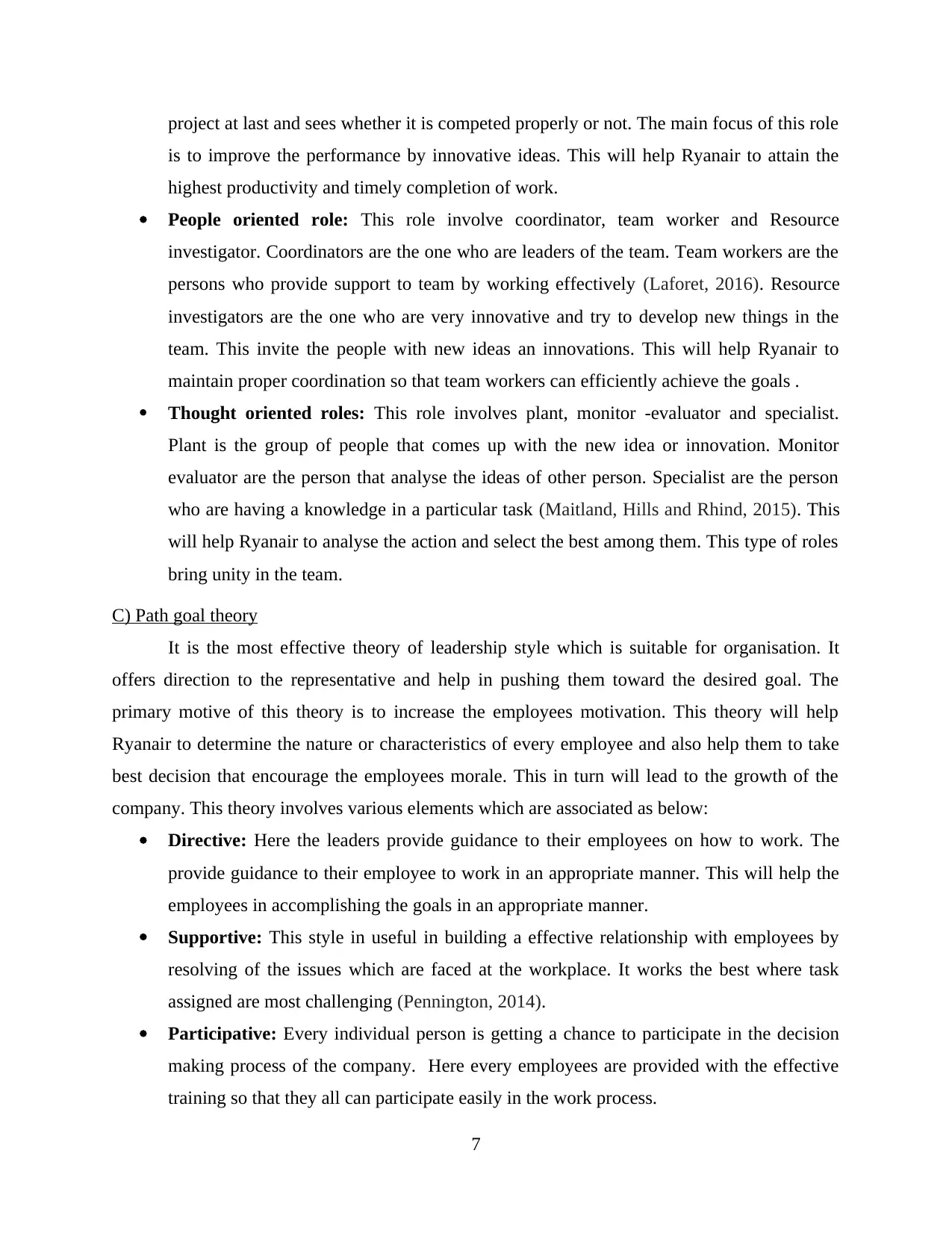
project at last and sees whether it is competed properly or not. The main focus of this role
is to improve the performance by innovative ideas. This will help Ryanair to attain the
highest productivity and timely completion of work.
People oriented role: This role involve coordinator, team worker and Resource
investigator. Coordinators are the one who are leaders of the team. Team workers are the
persons who provide support to team by working effectively (Laforet, 2016). Resource
investigators are the one who are very innovative and try to develop new things in the
team. This invite the people with new ideas an innovations. This will help Ryanair to
maintain proper coordination so that team workers can efficiently achieve the goals .
Thought oriented roles: This role involves plant, monitor -evaluator and specialist.
Plant is the group of people that comes up with the new idea or innovation. Monitor
evaluator are the person that analyse the ideas of other person. Specialist are the person
who are having a knowledge in a particular task (Maitland, Hills and Rhind, 2015). This
will help Ryanair to analyse the action and select the best among them. This type of roles
bring unity in the team.
C) Path goal theory
It is the most effective theory of leadership style which is suitable for organisation. It
offers direction to the representative and help in pushing them toward the desired goal. The
primary motive of this theory is to increase the employees motivation. This theory will help
Ryanair to determine the nature or characteristics of every employee and also help them to take
best decision that encourage the employees morale. This in turn will lead to the growth of the
company. This theory involves various elements which are associated as below:
Directive: Here the leaders provide guidance to their employees on how to work. The
provide guidance to their employee to work in an appropriate manner. This will help the
employees in accomplishing the goals in an appropriate manner.
Supportive: This style in useful in building a effective relationship with employees by
resolving of the issues which are faced at the workplace. It works the best where task
assigned are most challenging (Pennington, 2014).
Participative: Every individual person is getting a chance to participate in the decision
making process of the company. Here every employees are provided with the effective
training so that they all can participate easily in the work process.
7
is to improve the performance by innovative ideas. This will help Ryanair to attain the
highest productivity and timely completion of work.
People oriented role: This role involve coordinator, team worker and Resource
investigator. Coordinators are the one who are leaders of the team. Team workers are the
persons who provide support to team by working effectively (Laforet, 2016). Resource
investigators are the one who are very innovative and try to develop new things in the
team. This invite the people with new ideas an innovations. This will help Ryanair to
maintain proper coordination so that team workers can efficiently achieve the goals .
Thought oriented roles: This role involves plant, monitor -evaluator and specialist.
Plant is the group of people that comes up with the new idea or innovation. Monitor
evaluator are the person that analyse the ideas of other person. Specialist are the person
who are having a knowledge in a particular task (Maitland, Hills and Rhind, 2015). This
will help Ryanair to analyse the action and select the best among them. This type of roles
bring unity in the team.
C) Path goal theory
It is the most effective theory of leadership style which is suitable for organisation. It
offers direction to the representative and help in pushing them toward the desired goal. The
primary motive of this theory is to increase the employees motivation. This theory will help
Ryanair to determine the nature or characteristics of every employee and also help them to take
best decision that encourage the employees morale. This in turn will lead to the growth of the
company. This theory involves various elements which are associated as below:
Directive: Here the leaders provide guidance to their employees on how to work. The
provide guidance to their employee to work in an appropriate manner. This will help the
employees in accomplishing the goals in an appropriate manner.
Supportive: This style in useful in building a effective relationship with employees by
resolving of the issues which are faced at the workplace. It works the best where task
assigned are most challenging (Pennington, 2014).
Participative: Every individual person is getting a chance to participate in the decision
making process of the company. Here every employees are provided with the effective
training so that they all can participate easily in the work process.
7
⊘ This is a preview!⊘
Do you want full access?
Subscribe today to unlock all pages.

Trusted by 1+ million students worldwide
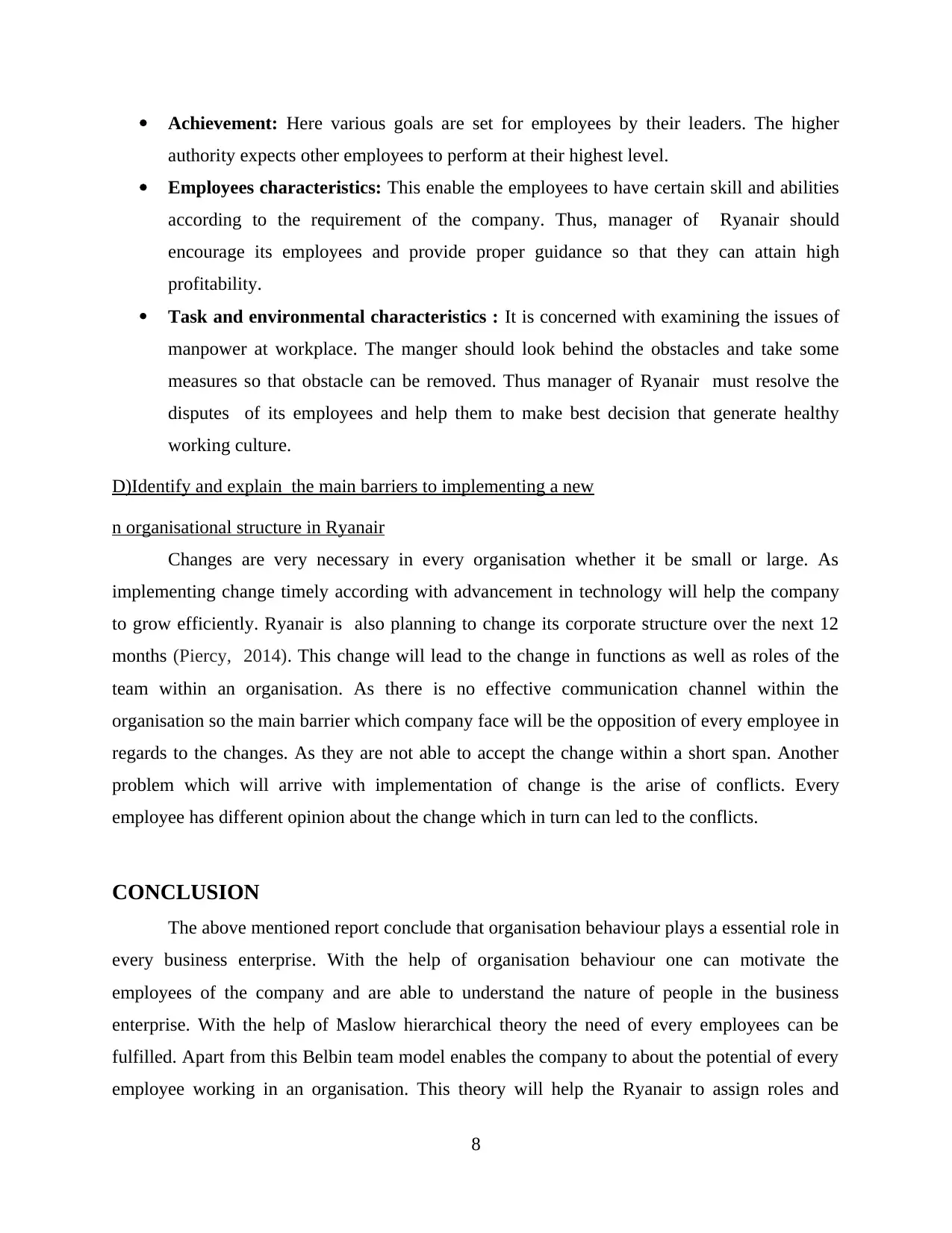
Achievement: Here various goals are set for employees by their leaders. The higher
authority expects other employees to perform at their highest level.
Employees characteristics: This enable the employees to have certain skill and abilities
according to the requirement of the company. Thus, manager of Ryanair should
encourage its employees and provide proper guidance so that they can attain high
profitability.
Task and environmental characteristics : It is concerned with examining the issues of
manpower at workplace. The manger should look behind the obstacles and take some
measures so that obstacle can be removed. Thus manager of Ryanair must resolve the
disputes of its employees and help them to make best decision that generate healthy
working culture.
D)Identify and explain the main barriers to implementing a new
n organisational structure in Ryanair
Changes are very necessary in every organisation whether it be small or large. As
implementing change timely according with advancement in technology will help the company
to grow efficiently. Ryanair is also planning to change its corporate structure over the next 12
months (Piercy, 2014). This change will lead to the change in functions as well as roles of the
team within an organisation. As there is no effective communication channel within the
organisation so the main barrier which company face will be the opposition of every employee in
regards to the changes. As they are not able to accept the change within a short span. Another
problem which will arrive with implementation of change is the arise of conflicts. Every
employee has different opinion about the change which in turn can led to the conflicts.
CONCLUSION
The above mentioned report conclude that organisation behaviour plays a essential role in
every business enterprise. With the help of organisation behaviour one can motivate the
employees of the company and are able to understand the nature of people in the business
enterprise. With the help of Maslow hierarchical theory the need of every employees can be
fulfilled. Apart from this Belbin team model enables the company to about the potential of every
employee working in an organisation. This theory will help the Ryanair to assign roles and
8
authority expects other employees to perform at their highest level.
Employees characteristics: This enable the employees to have certain skill and abilities
according to the requirement of the company. Thus, manager of Ryanair should
encourage its employees and provide proper guidance so that they can attain high
profitability.
Task and environmental characteristics : It is concerned with examining the issues of
manpower at workplace. The manger should look behind the obstacles and take some
measures so that obstacle can be removed. Thus manager of Ryanair must resolve the
disputes of its employees and help them to make best decision that generate healthy
working culture.
D)Identify and explain the main barriers to implementing a new
n organisational structure in Ryanair
Changes are very necessary in every organisation whether it be small or large. As
implementing change timely according with advancement in technology will help the company
to grow efficiently. Ryanair is also planning to change its corporate structure over the next 12
months (Piercy, 2014). This change will lead to the change in functions as well as roles of the
team within an organisation. As there is no effective communication channel within the
organisation so the main barrier which company face will be the opposition of every employee in
regards to the changes. As they are not able to accept the change within a short span. Another
problem which will arrive with implementation of change is the arise of conflicts. Every
employee has different opinion about the change which in turn can led to the conflicts.
CONCLUSION
The above mentioned report conclude that organisation behaviour plays a essential role in
every business enterprise. With the help of organisation behaviour one can motivate the
employees of the company and are able to understand the nature of people in the business
enterprise. With the help of Maslow hierarchical theory the need of every employees can be
fulfilled. Apart from this Belbin team model enables the company to about the potential of every
employee working in an organisation. This theory will help the Ryanair to assign roles and
8
Paraphrase This Document
Need a fresh take? Get an instant paraphrase of this document with our AI Paraphraser
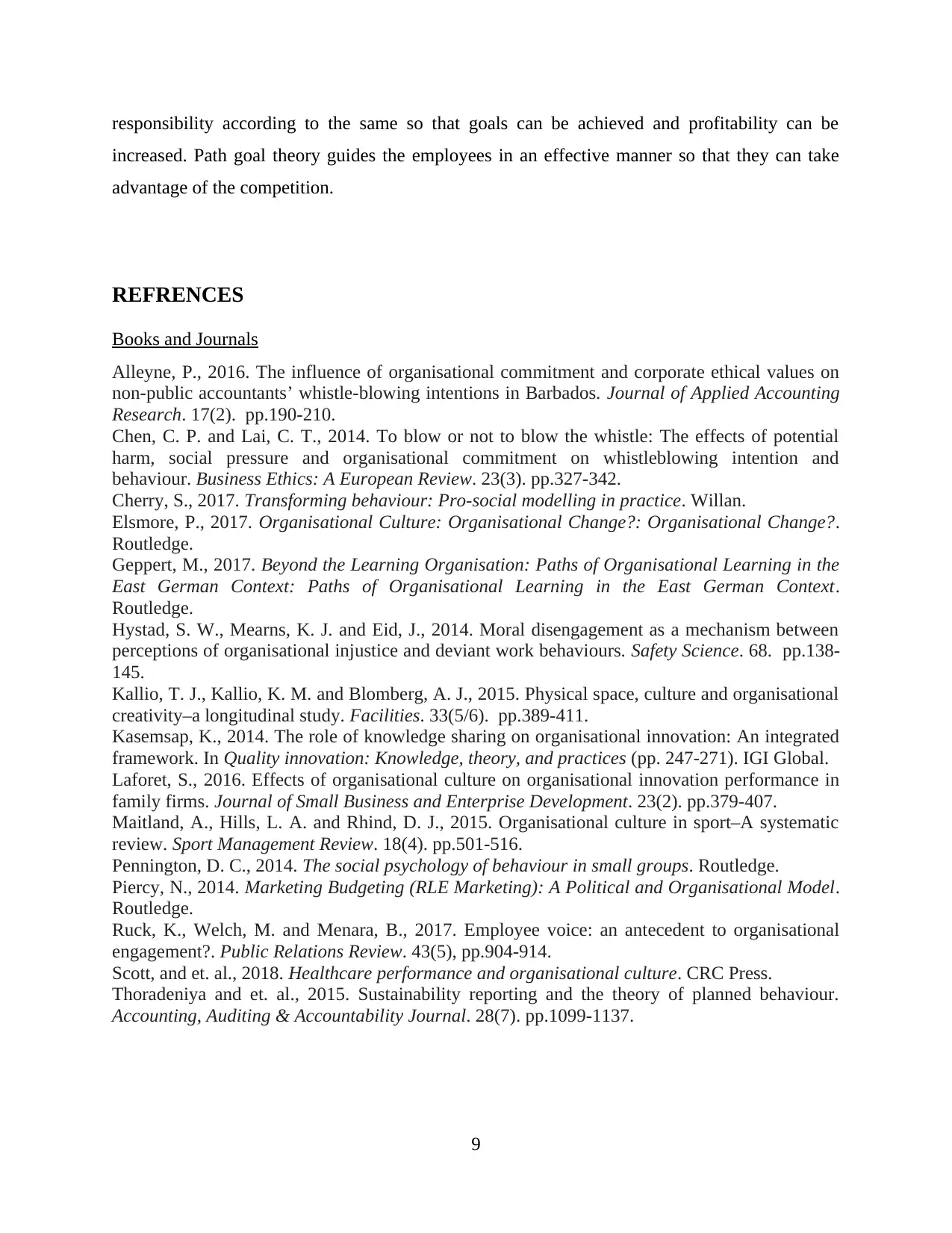
responsibility according to the same so that goals can be achieved and profitability can be
increased. Path goal theory guides the employees in an effective manner so that they can take
advantage of the competition.
REFRENCES
Books and Journals
Alleyne, P., 2016. The influence of organisational commitment and corporate ethical values on
non-public accountants’ whistle-blowing intentions in Barbados. Journal of Applied Accounting
Research. 17(2). pp.190-210.
Chen, C. P. and Lai, C. T., 2014. To blow or not to blow the whistle: The effects of potential
harm, social pressure and organisational commitment on whistleblowing intention and
behaviour. Business Ethics: A European Review. 23(3). pp.327-342.
Cherry, S., 2017. Transforming behaviour: Pro-social modelling in practice. Willan.
Elsmore, P., 2017. Organisational Culture: Organisational Change?: Organisational Change?.
Routledge.
Geppert, M., 2017. Beyond the Learning Organisation: Paths of Organisational Learning in the
East German Context: Paths of Organisational Learning in the East German Context.
Routledge.
Hystad, S. W., Mearns, K. J. and Eid, J., 2014. Moral disengagement as a mechanism between
perceptions of organisational injustice and deviant work behaviours. Safety Science. 68. pp.138-
145.
Kallio, T. J., Kallio, K. M. and Blomberg, A. J., 2015. Physical space, culture and organisational
creativity–a longitudinal study. Facilities. 33(5/6). pp.389-411.
Kasemsap, K., 2014. The role of knowledge sharing on organisational innovation: An integrated
framework. In Quality innovation: Knowledge, theory, and practices (pp. 247-271). IGI Global.
Laforet, S., 2016. Effects of organisational culture on organisational innovation performance in
family firms. Journal of Small Business and Enterprise Development. 23(2). pp.379-407.
Maitland, A., Hills, L. A. and Rhind, D. J., 2015. Organisational culture in sport–A systematic
review. Sport Management Review. 18(4). pp.501-516.
Pennington, D. C., 2014. The social psychology of behaviour in small groups. Routledge.
Piercy, N., 2014. Marketing Budgeting (RLE Marketing): A Political and Organisational Model.
Routledge.
Ruck, K., Welch, M. and Menara, B., 2017. Employee voice: an antecedent to organisational
engagement?. Public Relations Review. 43(5), pp.904-914.
Scott, and et. al., 2018. Healthcare performance and organisational culture. CRC Press.
Thoradeniya and et. al., 2015. Sustainability reporting and the theory of planned behaviour.
Accounting, Auditing & Accountability Journal. 28(7). pp.1099-1137.
9
increased. Path goal theory guides the employees in an effective manner so that they can take
advantage of the competition.
REFRENCES
Books and Journals
Alleyne, P., 2016. The influence of organisational commitment and corporate ethical values on
non-public accountants’ whistle-blowing intentions in Barbados. Journal of Applied Accounting
Research. 17(2). pp.190-210.
Chen, C. P. and Lai, C. T., 2014. To blow or not to blow the whistle: The effects of potential
harm, social pressure and organisational commitment on whistleblowing intention and
behaviour. Business Ethics: A European Review. 23(3). pp.327-342.
Cherry, S., 2017. Transforming behaviour: Pro-social modelling in practice. Willan.
Elsmore, P., 2017. Organisational Culture: Organisational Change?: Organisational Change?.
Routledge.
Geppert, M., 2017. Beyond the Learning Organisation: Paths of Organisational Learning in the
East German Context: Paths of Organisational Learning in the East German Context.
Routledge.
Hystad, S. W., Mearns, K. J. and Eid, J., 2014. Moral disengagement as a mechanism between
perceptions of organisational injustice and deviant work behaviours. Safety Science. 68. pp.138-
145.
Kallio, T. J., Kallio, K. M. and Blomberg, A. J., 2015. Physical space, culture and organisational
creativity–a longitudinal study. Facilities. 33(5/6). pp.389-411.
Kasemsap, K., 2014. The role of knowledge sharing on organisational innovation: An integrated
framework. In Quality innovation: Knowledge, theory, and practices (pp. 247-271). IGI Global.
Laforet, S., 2016. Effects of organisational culture on organisational innovation performance in
family firms. Journal of Small Business and Enterprise Development. 23(2). pp.379-407.
Maitland, A., Hills, L. A. and Rhind, D. J., 2015. Organisational culture in sport–A systematic
review. Sport Management Review. 18(4). pp.501-516.
Pennington, D. C., 2014. The social psychology of behaviour in small groups. Routledge.
Piercy, N., 2014. Marketing Budgeting (RLE Marketing): A Political and Organisational Model.
Routledge.
Ruck, K., Welch, M. and Menara, B., 2017. Employee voice: an antecedent to organisational
engagement?. Public Relations Review. 43(5), pp.904-914.
Scott, and et. al., 2018. Healthcare performance and organisational culture. CRC Press.
Thoradeniya and et. al., 2015. Sustainability reporting and the theory of planned behaviour.
Accounting, Auditing & Accountability Journal. 28(7). pp.1099-1137.
9
1 out of 11
Related Documents
Your All-in-One AI-Powered Toolkit for Academic Success.
+13062052269
info@desklib.com
Available 24*7 on WhatsApp / Email
![[object Object]](/_next/static/media/star-bottom.7253800d.svg)
Unlock your academic potential
Copyright © 2020–2026 A2Z Services. All Rights Reserved. Developed and managed by ZUCOL.





